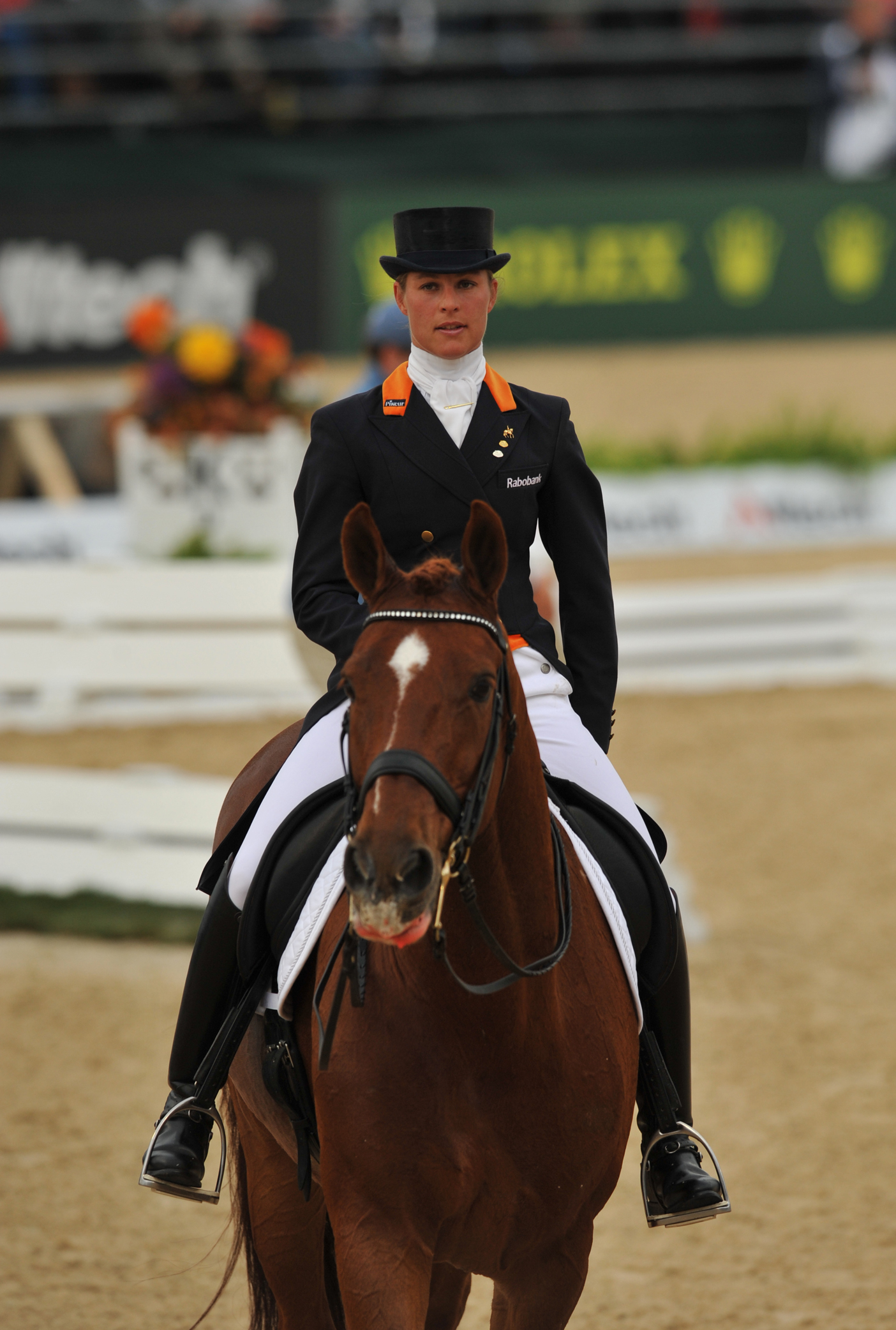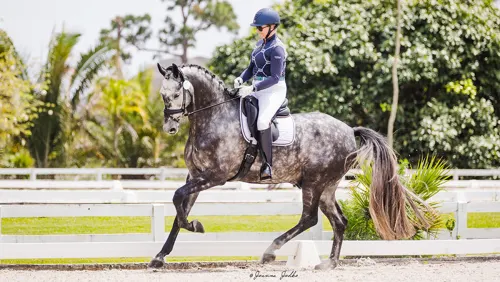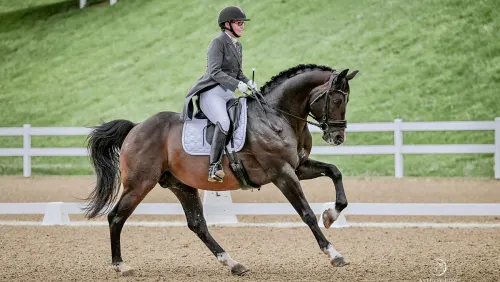Dutch dressage rider Adelinde Cornelissen and her Jerich Parzival started last year’s Alltech FEI World Equestrian Games as hot favorites for an individual medal. But their bid ended shortly after starting the Grand Prix test. A few movements into the ride, Parzival was rung out and eliminated from the rest of the competition for blood in the foam around his mouth. An examination back at the barn showed a small nick on the horse’s tongue.
WEG Technical Delegate Wojtek Markowski explained that Cornelissen was disqualified according to section 7 of Article 430 in the FEI dressage rules. This section covers elimination and states at the end: Other reasons for elimination may also be if “the performance is against the welfare of the horse.”
“It is standard practice in dressage that if there is blood coming from the horse’s mouth, then it is contrary to the horse’s welfare and results in elimination,” said Markowski. “The rules are very clear; this is elimination. There is no appeal.”
But it later turned out that the rules weren’t so clear. None of the Fédération Equestre Internationale rules directly addressed blood on the horse, though the U.S. Equestrian Federation rules specifically did. The USEF rule states: “Evidence of blood on a horse in the competition arena shall be cause for elimination from the class by the judge at ‘C’.”
This June, the FEI Dressage Committee proposed a new rule clarifying the appearance of blood on a competing horse. The proposal, created in part by the International Trainers Committee and set forth by FEI Dressage Committee members, states that a test will be stopped if blood is seen anywhere on a horse. The exceptions to that rule occur at the Olympic Games, World Equestrian Games, World Cup Finals and Continental Championships at the Grand Prix level. In those instances, the horse can be removed from the ring and then examined by an FEI veterinarian. If the veterinarian concludes that the bleeding is from a minor injury, and if the bleeding has stopped, the horse can resume competition.
The rule proposal was presented to all 133 national federations, and the USEF immediately came out against the change. Seven other countries responded in favor of it, and the rest of the federations didn’t respond at all. The USEF still plans to oppose the rule change at the FEI General Assembly on Nov. 11-14 in Rio de Janeiro and the German Equestrian Federation recently announced they would vote against it after receiving negative comments from the public.
“The FEI proposes a different rule from championships to normal shows. We don’t agree with that. We think it’s not the way to go,” said Janine Malone, USEF vice president for FEI affiliates and U.S. Dressage Federation secretary. “The FEI has the plan to allow horses to come back into the ring after they’ve been examined by the veterinarian, and we think that’s not going to be workable. It’s not fair to other entries, for one thing. Plus, televised events are on a tight schedule, and even with major events it doesn’t always work to have horses come back at a later time.”
ADVERTISEMENT
Sjef Janssen, a board member on the ITC and the Netherlands’ dressage team chef d’equipe, helped develop the rule proposal.
“After talking to some judges, they really felt not happy that they had to make those crucial decisions,” Janssen said. “They were not really sure about the severity of the cases because they’re not vets—they’re judges. We thought that it would be best for the experts to decide if the welfare of the horse was in trouble, or if the horse could go ahead with the test. The current rule was not clear at all, and we wanted it to be more perfect and more complete.”
Janssen added that part of the motivation behind the proposed rule change is to bring dressage in line with the other Olympic disciplines. The FEI show jumping rules state that disqualification will result with: “Horses bleeding on the flanks, in the mouth or nose, or marks indicating excessive use of spurs or of the whip anywhere on the Horse (in minor cases of blood in the mouth, such as where a Horse appears to have bitten its tongue or lip, Officials may authorize the rinsing or wiping of the mouth and allow the rider to continue; any further evidence of blood in the mouth will result in disqualification.)”
The current rule for FEI-level eventing is similar. “Horses bleeding in the mouth, nose or limbs: Such may be abuse of horse and will be reviewed case by case. In minor cases of blood in the mouth, such as where a horse appears to have bitten its tongue or lip, or minor bleeding on limbs, after investigation the Ground Jury may authorize the athlete to continue.”
“That’s also one of the big problems,” Janssen said. “Why would you have a rule for one discipline and not the other? Only the dressage world thinks it’s a lot different than the other disciplines, which is not true because all disciplines concern the welfare of the horse. Dressage people have the tendency to put themselves in a weak spot by trying to distance the sport from the others. We want to present all disciplines with a unified front.”
Kyra Kyrklund is president of the International Dressage Riders Club, and both Kyrklund and IDRC have come out against the rule change. There is also an online petition that currently has 12,484 confirmed signatures against the so-called “Blood Rule.” Many well-known Grand Prix competitors—including Steffen Peters, Laura Bechtolsheimer, Klaus Balkenhol and Guenter Seidel—have signed the petition.
“The danger of the current FEI draft is that a horse leaves the arena and a vet declares the problem to be minor. [Then] having returned to the arena, it happens again, and it is clear that the problem was not minor,” said Kyrklund. “We then appear to the world that we are a sport that dismisses the welfare of the horse when, in fact, the opposite is true. I know that even those that are pushing for the FEI draft don’t want a horse welfare issue. They just believe that a vet can be decisive.
ADVERTISEMENT
“The IDRC is also taking a pragmatic view,” she continued. “This has happened only once in the last 10 years in a championship, so why are we making a rule that could cause a real problem in our sport when it is just not necessary?”
Malone added that the proposed system could be even more subjective than the current one.
“Yes, it’s possible that some horses do have a minor injury and could continue competing, and it’s not fair,” she said. “The FEI proposal is for the treating vet to intervene and be able to review the situation. My problem with that is that the show vets aren’t subject to any conflict of interest stipulations for the event. They could be treating their best clients there. I think that would be enormously inconsistent. It wouldn’t be long before, at one show there’s serious blood and the horse isn’t eliminated, and then at another show there isn’t much blood, but the horse is eliminated. It will reduce the fairness issue but also end up not working and making dressage look bad.
“Most of the world is in agreement that this new rule wouldn’t work, and it’s mainly the Netherlands that supports it,” Malone added.
But Janssen countered that the public would respect a more definite rule.
“There are some people who are really against, but they don’t give you real reasons why,” he said. “They don’t come up with a better rule or changes; they don’t give you a real explanation as to why they’re against it. We’re just as concerned about the welfare of the horse, but we want to be aware of the fairness—not only to the horse but also to the riders, but also to the whole event.
“We’re living in modern times,” he added. “I think the fairness to the horse is way better than it was 20 or 30 years ago, but living in modern times also means there needs to be more attention paid to the media and sponsors and owners and national federations who invest lots of money in the sport. We cannot put them to the side with a simple, not-so-good rule. We want them to accept our sport as professional and with very clear rules.”
Delegates will vote on the rule change at the upcoming FEI General Assembly.















